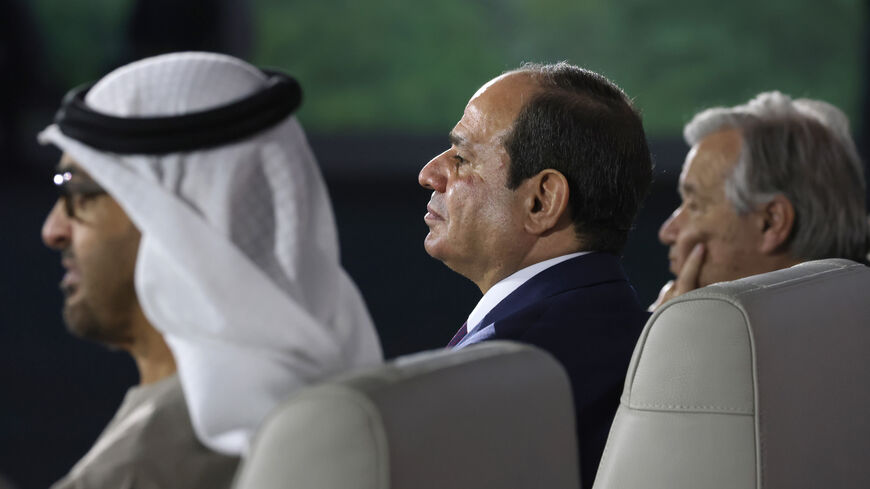DUBAI — Companies from the United Arab Emirates, Jordan, Egypt and Bahrain signed industrial agreements with an investment value of over $2 billion at the third Higher Committee Meeting of the Industrial Partnership for Sustainable Economic Development in Amman on Sunday.
Twelve agreements were signed for nine industrial projects in agriculture, pharmaceuticals, metals, chemicals and electric vehicles, according to the governmental Jordan News Agency, Petra.
All together, the agreements and projects are expected to generate 13,000 job opportunities.
In addition, 35 proposals for new projects were submitted to the executive committee to be considered for the future. There were selected from among 100 private companies that participated in workshops at the event.
Jordan hosted this year’s event and Prime Minister Bisher Al-Khasawneh attended the signing ceremony along with the industrial ministers of each of the four participating countries.
UAE Minister of Industry and Advanced Technology Sultan Ahmed Al-Jaber, the president-designate of the COP28 climate summit, commented on the benefits of these gatherings. In a statement by the Emirati government news agency WAM, Al-Jaber said, “This partnership is beginning to yield tangible results. It represents an exceptional model for industrial partnerships among private sector companies. It is testament to our collective ability to plan, integrate, and progress towards achieving our objectives.”
Egypt's Minister of Industry and Trade Ahmed Samir Saleh outlined Egypt's commitment at the event as its economy reels from high inflation. Cairo has pledged to reduce the role of state and military-owned companies. "The economic crisis the world is currently experiencing demonstrates the necessity of achieving industrial integration among Arab states. It is clear we must strengthen regional partnerships and include the private sector as a major partner in implementing sustainable development plans and helping the Arab region to prosper,” he said.
The agreements
-
Egypt’s Soda Chemical Industries announced an investment of $500 million to produce sodium carbonate, or soda ash, which is the main raw material in a number of industries including glass and detergent manufacturing. The facility will have a production capacity of 500,000 tons annually.
-
A memorandum of understanding was signed for a strategic partnership with the Emirates Flat Glass Company, owned by Dubai Investments, to purchase the final product.
-
UAE-based automotive manufacturer M Glory Holding launched a large manufacturing project with an investment of $550 million. The project will establish three electric vehicle factories with specialized production and assembly lines in the UAE, Jordan and Egypt. It is expected to produce 40,000 compact crossover SUVs during the first three years of operation.
-
M Glory Holding signed MoUs with the Jordan Design and Development Bureau and Egypt's Arab Organization for Industrialization as manufacturing partners and with the Bahrain-based Gulf Aluminum Rolling Mill to supply aluminum sheets.
-
Emirati-owned CFC Group announced it will invest $400 million to establish an industrial complex for fertilizers and chemicals in Egypt. It signed MoUs with Jordan-based Arab Potash and Egypt’s Misr Phosphate Company to supply raw materials. The industrial complex will produce fodder, potash fertilizers and other chemicals.
-
Emirates Global Aluminum announced a $200 million investment to establish a silicon metal plant in the UAE with a production capacity of 55,000 tons per year. The company signed an MoU with the Jordan’s Manaseer Group to supply the required crystalline silica.
-
Manaseer Group announced the expansion of a $70 million magnesium oxide plant in Jordan. Once completed, the plant will have a total production capacity of 270,000 tons annually, which will be exported to the UAE. It will sell its product to Emirates Global Aluminum. Production is set to commence in 2024.
-
The UAE's Globalpharma entered a partnership with Egypt’s Nerhadou to develop advanced technology for the manufacturing of medicines and supplements. An agreement was also signed to transfer technology to two Jordanian companies: Savvy Pharma and Triumph. Both projects will commence in 2023 with a total investment value of $60 million. Production capacity will reach five million packages annually per product.
-
Jordanian pharmaceutical manufacturing company Itqan Pharma announced a technology transfer partnership and contract manufacturing agreement with Globalpharma and ADCAN Pharma to manufacture syringes, aerosols and inhalers.
-
Itqan Pharma also entered an MoU with Egypt’s Marcyrl for the transfer of technology in manufacturing biosimilars in Jordan at a total investment value of $10 million, with the aim of launching products by Q4 2024.
-
Bahrain-based Alpha Biotic signed two MoUs for knowledge and technology transfer as well as contract manufacturing with Jordan’s Dar Al Dawa and Egypt’s EIPICO to produce general products, oncology products, medical solutions and other pharmaceutical products. At an investment value of $174 million over two phases, the project’s production capacity is expected to reach 350 million pills per year.
-
Gulf Biotech, a Bahraini company, announced plans to establish a plant to manufacture raw materials for vaccines and other products at an investment value of $103 million and a production capacity of 105 doses per year. Earlier this month, it signed a technology transfer agreement with Egypt’s BioGeneric Pharma.
The fourth meeting of the Higher Committee for the Integrated Industrial Partnership for Sustainable Economic Development will take place in Manama next year.
Last year the annual event took place in Cairo, where 12 projects worth $3.4 billion were announced.


.jpg?h=484aaada&itok=l9O0K7bm)





